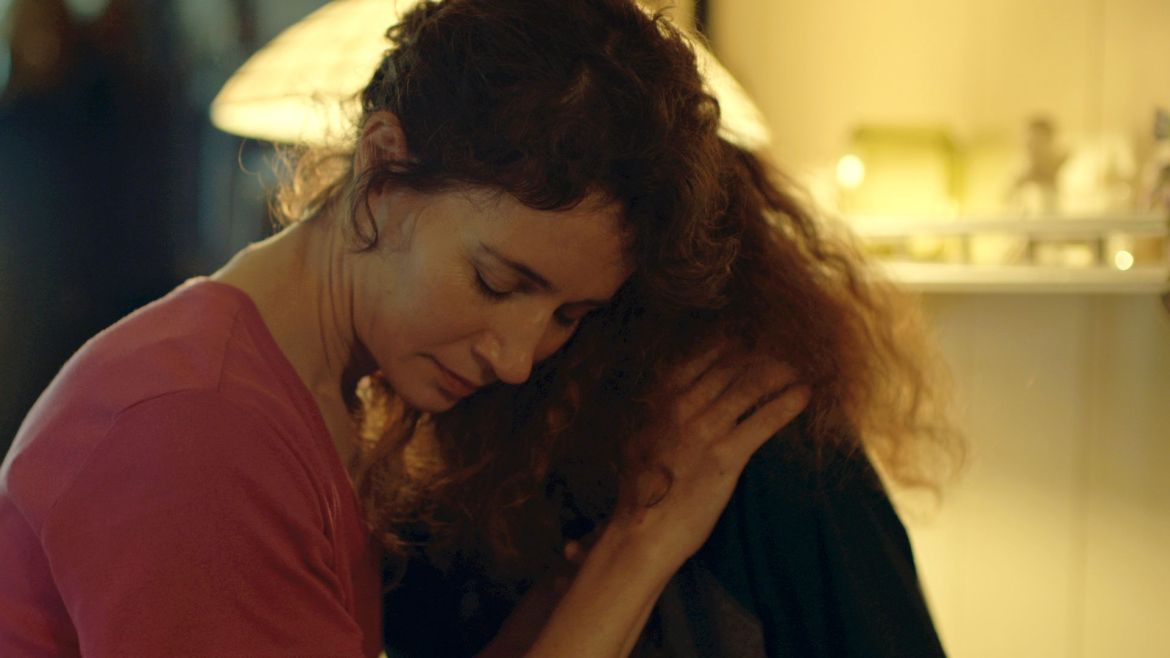Josephine Decker’s beautiful Madeline’s Madeline shows at Fantasia 2018 this week, and once again I am at a loss of how to describe it with justice. Told primarily from the close perspective of its main character, it’s both narrative and experimental, a dive into the complicated psyche of a young woman whose work with an experimental theater troupe begins to blend into her own life, emotional problems, and relationship with her mother.
Madeline’s Madeline tells the story of Madeline (Helena Howard), a teenager in New York who works out some of her personal issues via her participation in an experimental theatre troupe run by Evangeline (Molly Parker). Madeline has a complicated, caustic relationship with her overprotective mother Regina (Miranda July), and it is this relationship that begins, slowly, to form a part of her performance within the troupe. When Evangeline decides that she’s going to feature Madeline’s story more, and even involve Regina, the line between what is performance and what is real life begins to blur.
Rather than seeking to tell a straightforward narrative film, Madeline’s Madeline relies instead on a deep focalization of its narrative, setting the viewer inside Madeline’s mind and experience. There are few establishing shots—it took me some time to realize that the film was set in New York—and the characterizations are built from the inside out, leaving us to piece together the events before the film as well as simply the reasons why the characters relate to each other the way they do. The initial act is challenging because it’s hard for the viewer to settle in, especially as it blurs what is Madeline’s imagination, what is her reality, and what is her “performing” in the context of the theatre. This overlapping clarifies a bit in the second act, giving us more information to go on, and is finally upended in the third, as the troupe’s performance, Madeline’s relationships with her mother and with Evangeline, and the structure of the film itself blend together.

The further element of performance and how Madeline performs roles within the film, within the play, and within her own life, complicates the relationships even further. Where does the film end and the reality begin? What is performance, what is dream, what is the reality within a fictional construct? It’s a daunting task for a film to undertake, and the lyricism with which Decker approaches her subject is a study in itself. There are hints of surrealism throughout, but the film isn’t particularly surrealist—it has more in common with impressionism, with the kinetic camera taking the close perspective of its main character (though, it should be noted, the entire film is not shot from a first person point of view). The camera moves into and out of focus, replicating the nature of the narrative as we come to understand the characters.
Challenging though it is, Madeline’s Madeline is also remarkable for the compelling performances from all three leads, who eventually form a triangle of dependency. Evangeline takes on an increasingly motherly role as the film proceeds, but like Regina, she is projecting her needs, anxieties, and hopes onto Madeline. Regina, for her part, begins as apparently domineering and overprotective, and becomes more complex as more of Madeline’s past is revealed. The investigation of motherhood and the complex relationships between mothers and daughters is deep here; there are no easy answers, and the film doesn’t ask us to sympathize with any singular character. Rather, it is an attempt – and a very successful one, at that – to approximate the problems and complexities of female relationships and teenage life, of the way we understand and fail to understand one another. Madeline’s racial identification and how it is perceived by the people around her form another undercurrent to an already layered narrative—there is a deeply uncomfortable moment late in the film where racial signifiers come sharply into focus, and we see the problematic optics of two white women imposing their narratives on an interracial girl. This can be read as the film’s critique of itself as well, given that it’s written and directed by a white woman.
All of these overlapping and blurring narratives come together to make a fascinating, not always comprehensible piece of cinematic art. Madeline’s Madeline is something like a coming-of-age film, something like a narrative of self-discovery, and something like an art project that uses categories and tropes, but defies categorization. As Madeline explores her personality, guided by the strength and the insecurities of the two most important women in her life, she comes into her own self.
Madeline’s Madeline shows at Fantasia 2018 on July 30 and August 1.


Episode 44: Dame – Impossible – Citizen Dame
[…] Madeline’s Madeline […]
Episode 46: Justin Theroux is Real! – Citizen Dame
[…] Read Lauren’s Review […]